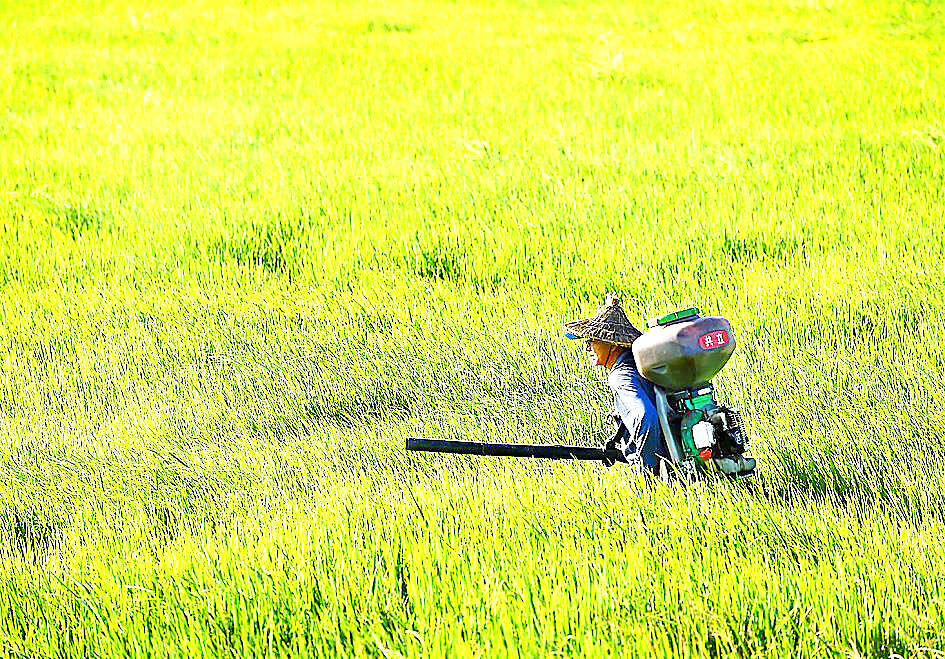The nation’s food self-sufficiency rate dropped to 30.3 percent last year, the lowest figure in 18 years, a report by the Ministry of Agriculture showed.
The 30.3 percent figure refers to how much of people’s total caloric intake in Taiwan derived from foods produced domestically.
Last year’s figure represented a drop from 30.8 percent in 2022 and 33.0 percent in 2013, to its lowest level since a 30.2 percent rate was recorded in 2005, the ministry said in its latest Food Supply and Utilization Annual Report.

Photo: Chu Pei-hsiung, Taipei Times
The main reason for the drop was a decrease in domestic production of rice — the largest single source of calories in Taiwan — caused in part by reduced irrigation to rice fields during a period of drought last year, the ministry said.
By food group, 25.5 percent of grains consumed in Taiwan last year were domestically produced, down 1.1 percentage point from 26.6 percent in 2022, the ministry said.
Meanwhile, 70.8 percent of meat consumed in Taiwan last year was raised domestically, down 2.7 percentage points from 73.5 percent in 2022, it said.
The drop in the proportion of domestic meat consumption was driven by factors including avian influenza and the modernization of pork-rearing facilities, which reduced production and led to a greater reliance on imports, the report said.
As for fresh produce, locally grown fruit accounted for 83.7 percent of total fruit consumption last year (a 0.8 percentage point increase from the previous year), while local vegetables made up 81.9 percent of the total (a 3.1 percentage point decrease), the ministry said.
The ministry’s Statistics Department said that the food self-sufficiency rate was affected not only by domestic production volume, but also by people’s consumption patterns.
In terms of the latter, the report said that per capita consumption of wheat-derived products — especially that of rice — had fallen in recent years.
The average person in Taiwan last year ate 42.07kg of rice, down from 44.96kg in 2013.
Meanwhile, consumption of wheat-derived product rose from an average of 36.47kg in 2013 to a high of 38.79kg in 2021, but dropped to 36.21kg last year, the report said.
By contrast, consumption of meat and poultry has risen sharply over the past decade, due to higher demand for protein from health enthusiasts and the adoption of more “Western-style diets,” the ministry said.
The average person in Taiwan last year ate 87.19kg of meat, up more than 15kg from 71.63kg in 2013, it said.
Consumption of fruits and vegetables remained more or less constant during that 10-year period, it added.

Palauan President Surangel Whipps Jr arrived in Taiwan last night to kick off his first visit to the country since beginning his second term earlier this year. After arriving at Taoyuan International Airport at around 6:30 pm, Whipps and his delegation were welcomed by Minister of Foreign Affairs Lin Chia-lung (林佳龍). Speaking to gathered media, the Palauan leader said he was excited and honored to be back in Taiwan on his first state visit to Taiwan since he was sworn in this January. Among those traveling with Whipps is Minister of State Gustav N. Aitaro, Public Infrastructure

President William Lai (賴清德) yesterday thanked Palau for its continued support of Taiwan's international participation, as Taipei was once again excluded from the World Health Assembly (WHA) currently taking place in Switzerland. "Palau has never stopped voicing support for Taiwan" in the UN General Assembly, the WHO and other UN-affiliated agencies, Lai said during a bilateral meeting with visiting Palau President Surangel Whipps Jr. "We have been profoundly touched by these endorsements," Lai said, praising the Pacific island nation's firm support as "courageous." Lai's remarks came as Taiwan was excluded for the ninth consecutive year from the WHA, which is being held in

RESOLUTIONS DEBATE: Taiwan’s allies said that UN and WHA resolutions cited by China and other nations ‘do not determine Taiwan’s participation in WHO activities’ A proposal to invite Taiwan to this year’s World Health Assembly (WHA) was rejected on Monday, resulting in Taipei’s absence from the annual meeting for a ninth consecutive year, although partners spoke up for Taiwan’s participation at the first day of the meeting. The first agenda item after the opening was a “two-on-two debate” on a proposal to invite Taiwan to participate at the WHA as an observer. Similar to previous years, two countries made statements in favor of the proposal, while two others expressed their opposition. Philippine Secretary of Health Teodoro Herbosa, president of the 78th WHA, accepted the WHA General Committee’s

At least three people died and more than a dozen were injured yesterday afternoon when a vehicle struck a group of pedestrians in New Taipei City’s Sansia District (三峽). The incident happened at about 4pm when a car rammed into pedestrians at an intersection near Bei Da Elementary School. Witnesses said the sedan, being driven at a high speed, ran a red light, knocking scooters out of the way and hitting students crossing the road before careening into a median near the intersection of Guocheng and Guoguang streets. The incident resulted in three deaths and 13 injuries, including the driver, a 78-year-old man